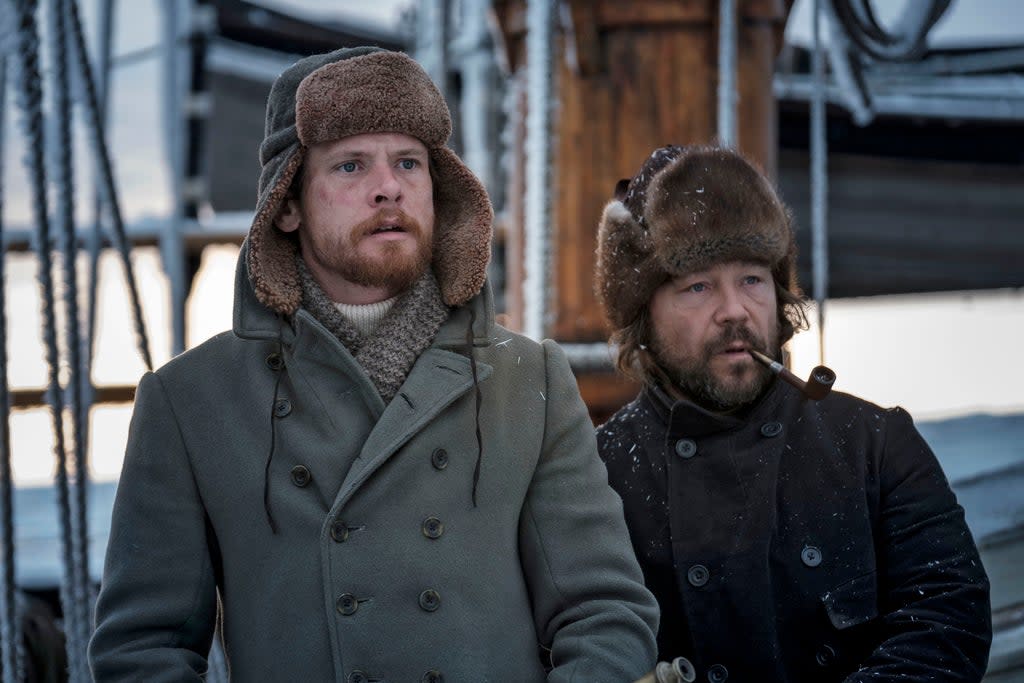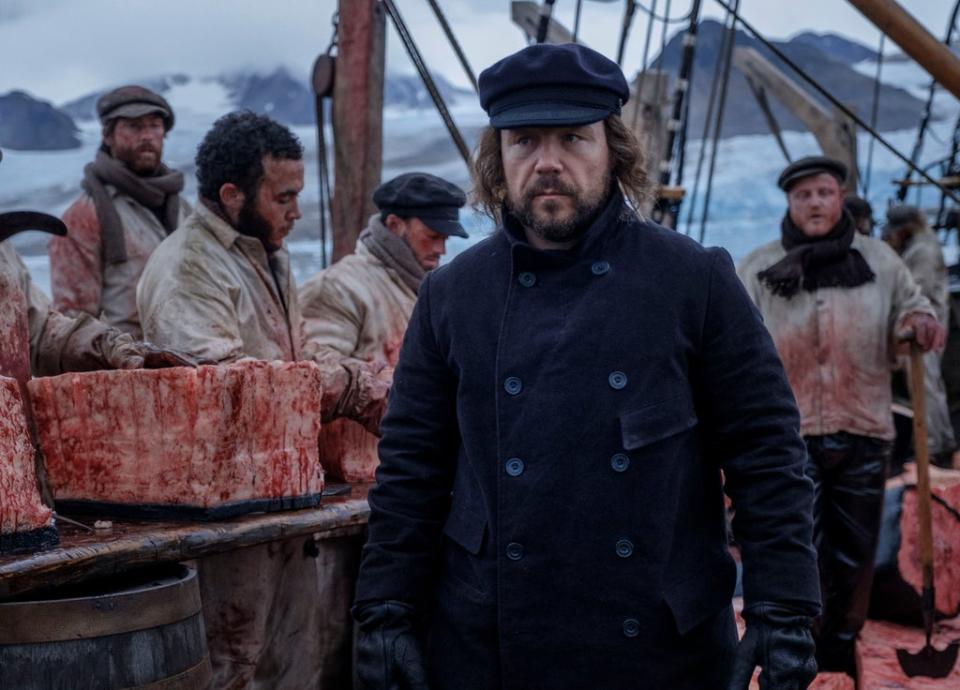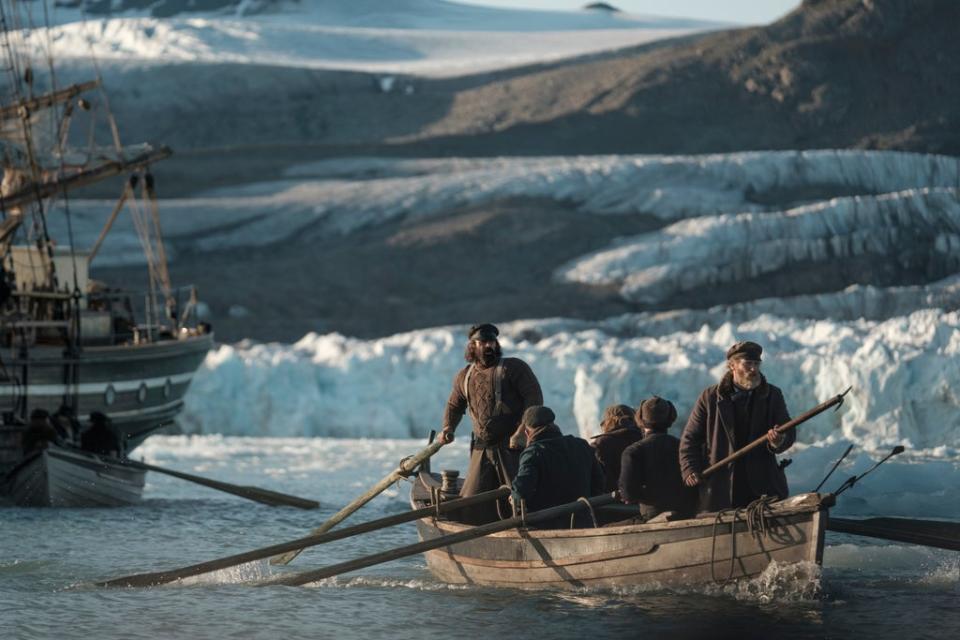The North Water review: Colin Farrell and Jack O’Connell lead a gruelling but richly rewarding period piece

The epigraph to this gruelling adaptation of Ian McGuire’s novel is a quote from Schopenhauer, suggesting that “the world is hell, and men are both the tormented souls and the devils within it.” Things don’t get much cheerier from there (later episodes have almost parodically dour titles like ‘We Men Are Wretched Things’ and ‘To Live Is To Suffer’).
The North Water, then, is a very different creature to the usual prestige period piece, despite sharing many of the typical component parts: Booker-longlisted source material, a critically acclaimed director in Andrew Haigh, the filmmaker behind the Bafta-nominated 45 Years and indie hits like Weekend and Lean on Pete, and a cast of familiar faces (albeit largely obliterated by shaggy facial hair, furry hats and, eventually, frostbite). It is far more existential, a sort of anti-comfort viewing that seeks to unsettle rather than reassure.
Jack O’Connell plays Patrick Sumner, a former army surgeon who has been dishonorably discharged after serving in colonial India. Job opportunities are not forthcoming after a court martial, leading him to accept a less than cushy gig as the ship’s doctor on The Volunteer (that the owner has promised to keep him in laudanum for the voyage’s duration is naturally an advantage, too). This Hull whaling ship is captained by the grasping Arthur Brownlee, played by the indefatigable Stephen Graham, now surely TV’s most in-demand man, dressed up in a matted brown wig and a series of long fur coats.

Some sailors, Brownlee tells his new doctor, think he is cursed; his last ship went down, with most of the crew drowning in the wreckage. What he doesn’t tell him, though, is that the entire affair was a very nineteenth century insurance scam — and that he and his unscrupulous moneyman Baxter (Hull’s own Tom Courtenay, in a brief but enjoyably unctuous turn) have already sketched out a similarly watery fate for The Volunteer.
A bad omen indeed, but perhaps the worst portent of all is the lurking presence of harpooner Henry Drax (Colin Farrell), whose violent job does not seem to provide sufficient outlet for his murderous instincts (even the most cursory vetting, you imagine, would conclude that this is not a man who should be let loose with a harpoon). He manages to exude menace even when Sumner is checking him for venereal disease. “Are you utterly indifferent to ethical considerations?” Sumner asks him at one point, provoking wolfish laughter. The answer, it seems, is a resounding ‘yes.’

Drax is a horror whose every grunt and stentorian breath floods The Volunteer’s narrow corridors with dread. With his hulking frame and shaggy beard, Farrell is essentially unrecognisable, but it is a transformation that fuels rather than overshadows this disquieting performance.
Haigh and cinematographer Nicolas Bolduc bring a raw, unfettered beauty to the Arctic scenes; much has been made of their decision to shoot The North Water in the Svalbard archipelago, the furthest north a drama has ever filmed, which has certainly paid off — it would be difficult to authentically recreate landscapes as striking and strange as these using CGI, without losing some of their power (the cast look genuinely windswept and frozen, too).

At the same time, the director takes an almost forensic approach to the brutal, bloody business of whaling. A sequence involving the battering and skinning of seals, whose bodies are then dragged across the snow, leaving bloody red trails in the whiteness, is unsparing in its gore; when Drax finally spears his prey, a plume of scarlet springs into the air, then the whale’s strangely foamy blubber is methodically chopped up into tiny squares, drenching the deck in oily, stinking residue. One crew member reminds a repulsed Sumner that these foul raw materials will soon ornament the sort of fine Victorian ladies we’re accustomed to seeing in costume drama, in the form of whalebone corsets and expensive perfumes.
The pace is slow and considered, especially as the journey to the Arctic begins, but if you’re hardy enough to persist, The North Water is richly rewarding. Its unnerving character studies, probing the psyches of these “refugees from civilisation,” pushed to the very extreme by their surroundings and each other, are not easily forgotten.
The North Water is on BBC One and BBC iPlayer, September 10 at 9pm. All episodes available online afterwards.
Read More
Shaniqua Okwok: There aren’t many complex roles for young black women
Gogglebox star Pete Sandiford marries his girlfriend in secret wedding

 Yahoo News
Yahoo News 
